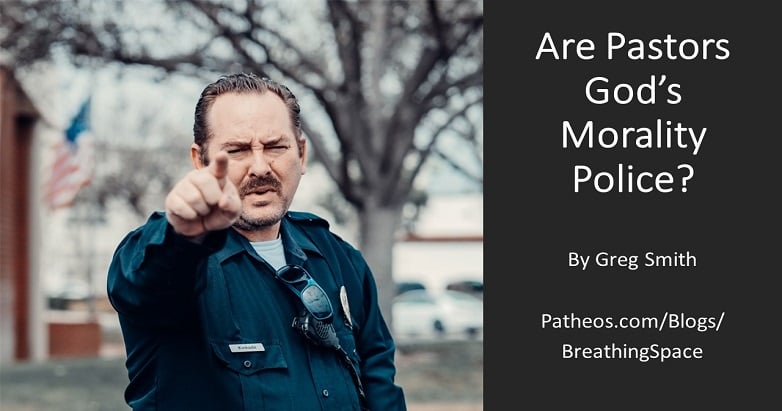Are pastors supposed to function as God’s morality police? Is there a better way than trying to control people’s sins and modify their behavior?

In part one of this series, we looked at how “Matthew eighteening” church members we view as sinners is an abuse of scripture and people. Another Bible passage that leaders use to justify their spiritual bullying is 1 Corinthians 5:1-11. Here, Paul rebukes the church for allowing sin in their midst.
1 Corinthians 5:1-11 NRSVUE
It is actually reported that there is sexual immorality among you and the sort of sexual immorality that is not found even among gentiles, for a man is living with his father’s wife.2 And you are arrogant! Should you not rather have mourned, so that he who has done this would have been removed from among you?
3 For I, though absent in body, am present in spirit, and as if present I have already pronounced judgment 4 in the name of the Lord Jesus on the man who has done such a thing. When you are assembled and my spirit is present with the power of our Lord Jesus, 5 you are to hand this man over to Satan for the destruction of the flesh, so that the spirit may be saved in the day of the Lord.
6 Your boasting is not a good thing. Do you not know that a little yeast leavens all of the dough? 7 Clean out the old yeast so that you may be a new batch of dough, as you really are unleavened. For our paschal lamb, Christ, has been sacrificed.8 Therefore, let us celebrate the festival, not with the old yeast, the yeast of malice and evil, but with the unleavened bread of sincerity and truth.
9 I wrote to you in my letter not to associate with sexually immoral persons, 10 not at all meaning the sexually immoral of this world, or the greedy and swindlers, or idolaters, since you would then need to go out of the world.11 But now I am writing to you not to associate with anyone who bears the name of brother or sister who is sexually immoral or greedy or an idolater, reviler, drunkard, or swindler. Do not even eat with such a one.
Handed Over to Satan
Paul encourages the congregation to hand the sexually sinful man over to Satan, for the good of the church and the salvation of his soul. He tells them not to even eat with him, a reference to the Lord’s Supper. In this excommunication, Paul hopes that by letting the Devil have him, the erring Christian will be so distraught that he will repent and run back to the church’s covering. In this way, the church maintains its purity by refusing him fellowship until he repents. So, in an odd kind of way, the man’s soul is saved by the church shunning him.
I wish I could argue against this scripture the same way I discussed Matthew 18. In my last article, I stated that pastors who use the scripture to justify church discipline misunderstand and misrepresent Jesus’s original intention. In this case, though, I’m convinced that Paul intended exactly what it sounds like he is saying. According to Paul, the church’s purity is at risk as long as sexually immoral people are among them. So, Paul says to cast them out.
Jesus or Paul?
The problem with following Paul’s injunction not to eat with sinners is that Jesus did just that. He ate and drank with sex workers, tax collectors, people with addiction, and other people the Pharisees considered sinners. Remember that Paul was originally a Pharisee before he came to Christ. In this case he is writing from the vestiges of that tradition rather than from the grace of Jesus. Sometimes when we read Paul, we have to sift through his moralism.
This sifting would be a problem if the Bible were one coherent book written by a single Author, God. But here we see Paul’s capacity to understand things completely outside of the grace of Christ. It becomes evident that God is not the Author, but Paul is expressing his own opinions. Instead of Paul’s inconsistencies being a problem for Bible students, we should welcome the discrepancy because it shows the humanity of early church leaders. It demonstrates the way they struggled to understand just as we do. If this scripture were the word-for-word, infallible truth of God, we would find ourselves confused by the way this passage seems at odds with the sinner-loving Jesus of Nazareth. But since the Bible is not the Word of God (Jesus is), then we understand that Paul’s words are only the light that points to Jesus. Paul can make mistakes. Here, we must take our cue from Jesus rather than from Paul.
Church leaders who employ the Bible as a tool for spiritual bullying follow the same pharisaical spirit that Paul tried so hard to resist within himself. Sometimes his inner fundamentalist comes out in his writings. Paul was truly a man divided between religiosity on the one hand and grace on the other. This is why we can’t take everything he says as gospel truth. (He wasn’t even in the gospels, after all!) Paul’s words are commentary on Jesus and the Christian Life. Sometimes he gets it right, and sometimes he gets it wrong. Regarding church discipline and spiritual bullying, Paul gets it wrong.
Shepherds and Flocks
Many pastors are quick to jump on the church discipline bandwagon. They see themselves as the God-given morality police of their churches. This is because they view themselves as the spiritual authority of their church. In their eyes, the shepherd (pastor) is the one who decides where to lead the flock (church) for pasture. The shepherd protects the sheep. I’ve actually heard more than one pastor say that the shepherd carries a staff so it can fight off wolves, but every now and then the sheep need a good thumping, too!
The problem with this is that it views the pastor as the lead shepherd. But Jesus said that He is the Good Shepherd who lays down his life for his sheep. With His life, Jesus earned the authority for himself over the church. Pastors must realize that they are the under-shepherds, and not the Lead Shepherd. It’s Jesus who decides where to lead the flock to pasture, Jesus who fights off the wolves. And Jesus never uses his staff to give the sheep a good thumping. Under-shepherds don’t lead with power and authority, but with influence and love.
Any pastor who dominates their church by claiming to be the God-ordained spiritual authority is spiritually abusive. Don’t get me wrong. I’m not saying they are bad people. They may just be perpetuating what they were taught in seminary or by their own pastor when they were growing up. They might not even know that they are being abusive. But we have learned that abuse begets abuse. Hurt people hurt people. And this can happen in the church as well. So, instead of the pastor as morality police, doling out spiritual discipline to parishioners, what’s the alternative?
Instead of That, Do This…
Church leaders who are tempted to discipline their parishioners a la Matthew 18 and 1 Corinthians 5 would do well to read 1 Corinthians 13. They would learn that leadership that is loving is also patient and kind. It is not angry, boastful, proud, or rude. It does not seek its own way. Loving leadership is not easily offended. It keeps no record of wrongs. It bears all things, believes all things, hopes all things, endures all things. If loving leadership practices this, it will never fail.
If you are a church leader, this means that when you see a fellow Christian with sin in their life, you are patient and kind with them. You do not get angry and threaten excommunication. You are not boastful, proud, or rude, as if you have no sin of your own. You do not seek your own way, imposing your own standard of conduct upon members of your church. You are not easily offended by someone else’s misdeeds. You don’t keep a track record of them so that once they reach a certain score you can pounce. Love bears all things and endures all things. This means you let some things slide as long as they’re hurting no one.
Of course, you don’t resignedly give up on the hope of people living better lives. Instead, loving leadership believes all things and hopes all things. This means that you gently call people to self-improvement as led by the Holy Spirit and fueled by the love of Christ. It means gently guiding them to know better and to do better. It means sticking with them until they change—not kicking them out unless they do.
If we are to follow Paul’s advice on leadership, it would be better to follow 1 Corinthians 13 instead of 1 Corinthians 5. You can’t practice both of these things at the same time. 1 Corinthians 13 seems a lot more like Jesus, while First Corinthians 5 feels like it comes from Paul’s pharisaical background. Chapter five recommends the opposite of what Jesus did in his own ministry. If pastors are going to be true under-shepherds, that means they must follow the example of the Chief Shepherd. This doesn’t mean forcing people into compliance or conformity. It doesn’t mean functioning as God’s morality police. Instead, it means leading by love and example.












